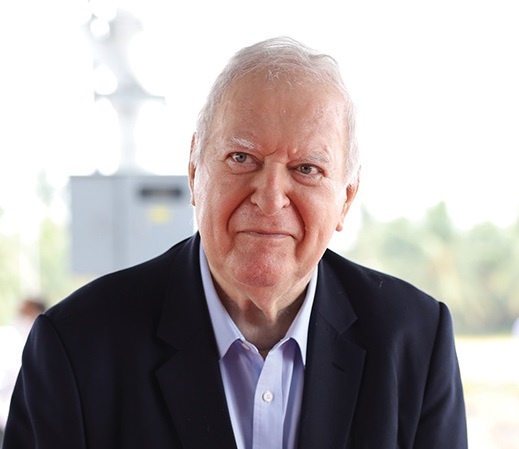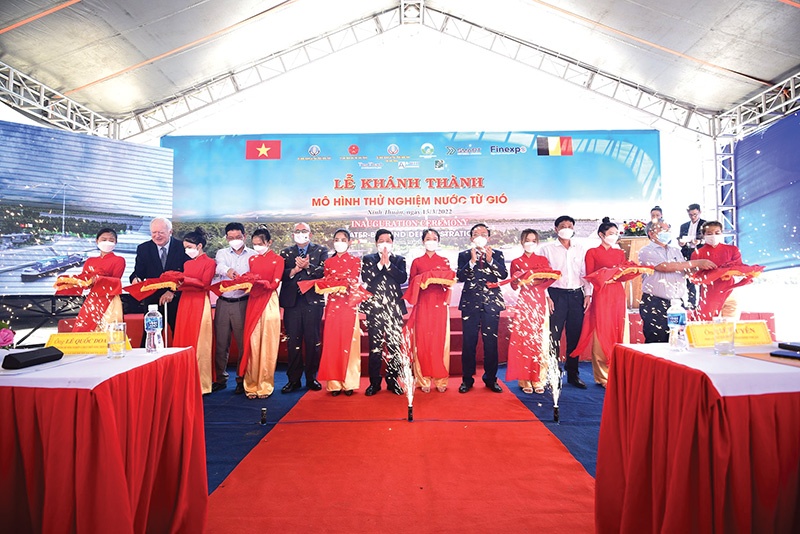Benefits clear in new freshwater model for localities
Why did Smart Universal Logistics (SUL) choose to develop the water-by-wind demonstration in Ninh Thuan province?
 |
| CEO Marc Stordiau |
The system is our ambition to combine the energy-intensive operation of desalination with renewable energy so that we can reduce overall carbon emissions in the process. We chose Ninh Thuan as the first testing site for our machine because it has always had the need for new water supply solutions and because the province is very prone to drought – it has a dry season spanning 8-9 months with very limited rain. In addition, Ninh Thuan is one of the best locations in Vietnam for wind energy as there are already several producing wind farms operational in the province. We would like to build one small turbine first by the end of 2022 to supply energy to our existing desalination system and we think Ninh Thuan would be able to provide the most stable wind energy.
How do you evaluate the feasibility of the project for replication along the coastline of Vietnam?
For the moment, in terms of the technology, we would like to initially test the combination of grid energy and wind energy in locations with good wind potential in Vietnam such as Ninh Thuan. At the same time, our engineers are looking at implementing other solutions for renewable energy that are potentially more reliable than wind, which might fit better with the Vietnamese climate.
Economically, the system is financially feasible in locations that are in high demand for freshwater and farmers are either having to transport water themselves or have to buy from sellers that bring water into the province by trucks.
In the future, with improvements in the technology and with partial procurement of local components in Vietnam, we hope to reduce the initial investment of each unit to be able to produce water at a cheaper price. With the support of renewable energy, we can potentially cover the cost of water production by reinjecting electricity into the grid.
 |
| SUL is starting its water-by-wind journey in Ninh Thuan but wants to go much further |
What benefits does the project bring to local people and what side effects could it cause for the environment?
The first benefit would be the fresh water produced by the system. It is important for the livelihoods of farmers to have sufficient access to clean water to secure a healthy lifestyle. We will provide fresh water from the system for free to 10 local poor households specifically selected by Mekong Plus, a partner NGO from Belgium that is active in Ninh Thuan.
We will also provide water for 1,000 square metres of farming production, and we hope to realise the impact of this supplementary water supply on securing the production of that land area. Eventually, the planned wind turbine can supply electricity overall, and any access production will be supplied to the local community. So there are no harmful effects on the environment. This is a green, renewable solution model.
How will the maintenance be performed periodically to ensure smooth operation, and which destinations will be next for the scheme?
SUL will only be responsible for maintenance for six months. We will provide all technical and operational manuals to local technicians during the demonstration period and give them proper training on how to operate and maintain the system prior to starting the demonstration.
Once the system has been eventually transferred to the local government, it must find suitable people with the support of SUL for operation and maintenance.
After Ninh Thuan, we plan to install the technology on a larger scale in two other locations in Vietnam. I have received orders from two companies in Vietnam to buy our technology solution. I hope that if the negotiation goes smoothly, we will deploy the project next year. And we might start the first full-scale plant in one of the coastal provinces of the Mekong Delta – either Ben Tre, Bac Lieu, or Tra Vinh.
What the stars mean:
★ Poor ★ ★ Promising ★★★ Good ★★★★ Very good ★★★★★ Exceptional
Latest News
More News
- MAE names big 10 policy wins in 2025 (February 06, 2026 | 08:00)
- US firms deepen energy engagement with Vietnam (February 05, 2026 | 17:23)
- Vietnam records solid FDI performance in January (February 05, 2026 | 17:11)
- Site clearance work launched for Dung Quat refinery upgrade (February 04, 2026 | 18:06)
- Masan High-Tech Materials reports profit: a view from Nui Phao mine (February 04, 2026 | 16:13)
- Hermes joins Long Thanh cargo terminal development (February 04, 2026 | 15:59)
- SCG enhances production and distribution in Vietnam (February 04, 2026 | 08:00)
- UNIVACCO strengthens Asia expansion with Vietnam facility (February 03, 2026 | 08:00)
- Cai Mep Ha Port project wins approval with $1.95bn investment (February 02, 2026 | 16:17)
- Repositioning Vietnam in Asia’s manufacturing race (February 02, 2026 | 16:00)

 Tag:
Tag:














 Mobile Version
Mobile Version